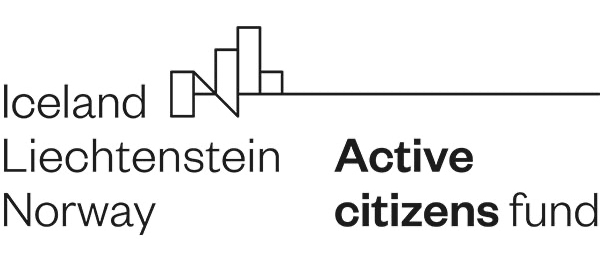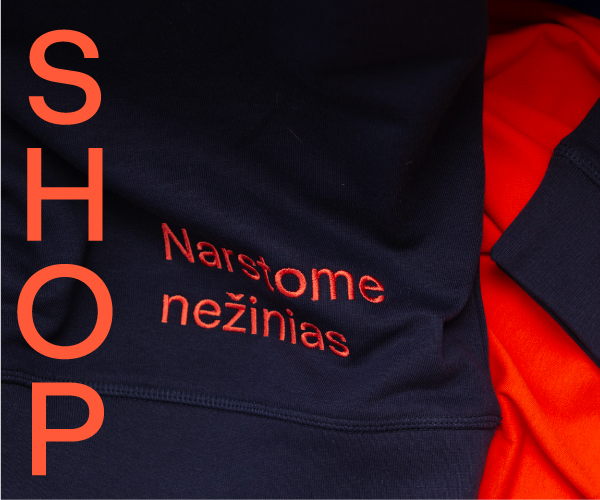This audio documentary has been nominated for PRIX EUROPA 2023 in the Audio Documentary category. It was also selected for the “Banguoja” audio festival program in 2023. It was first published on 16 October 2022 in Lithuanian. Now you can listen to it with English subtitles on our YouTube:
Some people in Lithuania observe the war in Ukraine far closer than others. The war is happening in their families, too. When talking to their parents, they get a feedback of Russian propaganda narratives, since their parents consume Russian media and support Russia. Some choose not to talk about the war with their families, others argue with their parents or completely sever their ties to the family.
“I had this thought in my head since my teenage years: what if there was a war with Russia? <...> And I’d understand that my parents and I’d probably be on opposite sides of the barricades. And then it actually happened,” says photographer Andrej Vasilenko.
Andrej Vasilenko was born in a family of Lithuanian Russians. He graduated from a Russian-speaking school. He moved out when he was 19, and started noticing how his parents’ environment and attitude to Russia differed from his friends’.
The contrast intensified by the Maidan Revolution in Ukraine and Russia's annexation of the Crimean peninsula. Once, at the dinner table, Andrej's parents said they supported the annexation of Crimea. That time Andrej got so angry with his family that they did not speak for six months.
Journalism student and NARA contributor Julija Stankevičiūtė grew up with her mother and two brothers in Kaunas, in the early 2000s. “When I was little, I remember how my parents would tell me to get interested in Russian culture and read Tolstoy and Dostoyevskiy. They’d tell me stories from their youth, how they’d travel around Russia, how cool it was to travel by train, to visit the Hermitage. And they’d always tell me to learn Russian. There was no real pressure, but they’d very often talk about it ‘being a great culture, you should learn about it, because it is exceptional’.”
Julija's parents are Lithuanian, she has no Russian roots. She believes that her mother started to idealize Russia after Lithuania regained its independence. “My family was among those who were not too excited about the independence, because it meant poverty to them, not happiness.”
“I know she believes it, but I don’t know if I can blame her, because it seems like a very systematic propaganda influence. I’m sure my mom’s not the only one like that, there are many people in a similar situation. <...> They simply don’t know whom to trust, so they trust the most comfortable source for them which is Russia. I just choose not to take part in such conversations, because it’s still my family and I love my mom very much, but, to keep my mental health, I simply refuse to talk about it. Because I’d get really upset and it’d be hard for me to talk about it without strong emotions.”
Elena, whose real name we withhold to preserve her anonymity, was born in a Russian family. Before being appointed to work in the Baltic states, her parents used to live in Russia. Of the three, they chose Lithuania.
Until her teenage years, Elena's environment was exclusively Russian-speaking. However, in the 9th grade, she decided to transfer to a Lithuanian school, which led her to rethink her identity.
“This was a journey towards me being more Lithuanian. This identity problem bothered me for a very long time, because I kind of thought that I must choose only one identity: I am either Lithuanian or Russian. And only when I matured enough, I understood that I can actually negotiate between the both.”
However, Elena's mother never associated herself with Lithuania and kept saying that she would leave for Russia when she retired. On February 24, when Russia started a full-scale invasion of Ukraine, Elena had a conflict with her mother and told her: “The events in Ukraine… I don’t know how to talk to you, if you don’t accept that. I can’t accept you, then. A line had been crossed, after which I started thinking that truth and justice are more important to me than my relationship with you.”
-
Buddy €5 mo.
Paminėsime jūsų vardą naujame NARA podkasto epizode ir pakviesime jus į uždarą NARA bendruomenės feisbuko grupę. Norime sukurti saugią bendravimo erdvę.
-
Penpal €10 mo.
Atsiųsime jums atviruką su NARA fotografų daryta nuotrauka ir padėka.
(+) visa kita, kas išvardyta viršuje -
Helpmeet €30 mo.
Norime su jumis pasimatyti. Visus, prisidedančius šia suma, kviesime į susitikimą pasikalbėti apie žurnalistiką ar kitą mums ir jums įdomią temą.
(+) visa, kas išvardyta viršuje -
Patron €100 mo.
Padovanosime jums pasirinktą spausdintą didelio formato fotografiją iš NARA kolekcijos ir padėkosime jums kiekviename podkasto epizode. Lai jūsų indėlis būna matomas.
(+) visa, kas išvardyta viršuje













